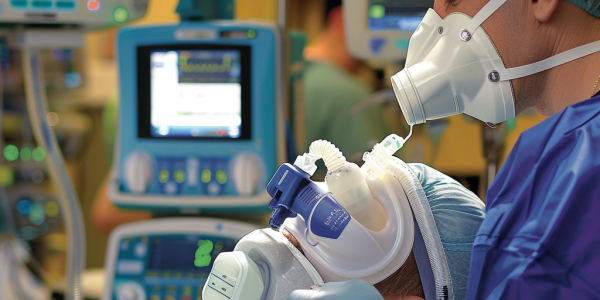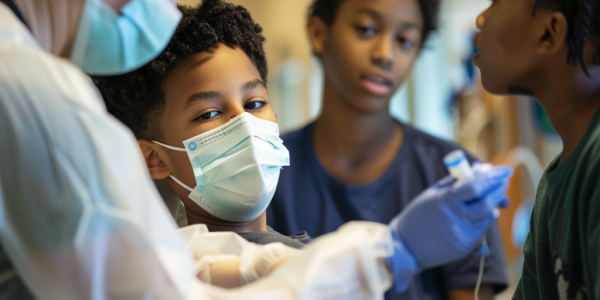The Mace vs. Sword: Exploring Minecraft’s Newest Weapon Addition
Explore the differences between Minecraft’s new mace weapon and the traditional sword, from weapon stats to utility and acquisition methods. Discover how the mace’s unique abilities and playstyles are changing the game for players in the latest update.
The Legacy of Dyson Spheres in the Search for Alien Life
Learn about the fascinating concept of Dyson spheres, proposed by physicist Freeman Dyson as a potential method to detect alien life in the universe. Discover how these hypothetical megastructures could emit detectable waste heat in the form of infrared radiation, sparking excitement within the scientific community. Explore the legacy of Dyson’s visionary idea and its impact on the search for extraterrestrial beings.
Effectiveness of BiPAP for Preoxygenation Examined in PREOXI Trial
Discover the latest findings from the PREOXI trial, a study investigating the use of BiPAP for preoxygenation in intubation procedures. Learn how this research could impact clinical practices and optimize patient care in emergency departments and ICUs.
Study Reveals Role of Germ Cells in Lifespan Differences Between Genders
Japanese scientists have uncovered the mystery behind why women tend to outlive men, pointing to the role of cells that develop into sperm and eggs in determining lifespan differences. The groundbreaking research on killifish from Osaka University reveals that inhibiting germ cell production led to longer male lifespans and shorter female lifespans, shedding light on the impact of reproductive cells on longevity disparities between genders.
Debunking the Myth: Blue Light from Smartphones May Not Disrupt Sleep as Previously Thought
New research challenges the fear of blue light from smartphone screens disrupting sleep patterns. Studies fail to establish a significant link between screen light exposure before bedtime and difficulties in falling asleep. Experts suggest that other sources of artificial light in our living spaces may pose a greater risk of disrupting melatonin production than smartphones.
Robot-Controlled Radiotherapy Shows Promise in Treating Age-Related Macular Degeneration
Robot-controlled radiotherapy shows promising results in reducing the number of injections needed for patients with age-related macular degeneration (AMD). With potential cost savings and improved patient experience, this innovative approach could revolutionize the treatment of this prevalent eye disease, offering hope for better outcomes and enhanced quality of life.
Study finds Paxlovid reduces hospitalization risk in pediatric COVID-19 patients
A University of Hong Kong study found that treatment with the antiviral drug Paxlovid is linked to a 34% lower risk of hospitalization in COVID-19 patients aged 12-17. The research showed that Paxlovid reduced hospitalization rates and was effective in non-hospitalized pediatric patients with the Omicron variant.
First Human Case of Lyme Disease in 2024 Reported in Middlesex County
The Middlesex-London Health Unit (MLHU) has reported the first human case of Lyme disease in 2024, affecting an adult from Middlesex County. Dr. Joanne Kearon from MLHU highlighted the significance of this case being diagnosed earlier in the year compared to typical Lyme disease cases. Ontario is known to have 13 established species of ticks, with many more reported across the province. These insects, active mostly during the summer months, pose health risks as they can carry infectious agents, including Lyme disease.
Rising Rates of Colorectal Cancer Among Younger Adults Cause Concern
Colorectal cancer rates have been rising among individuals under 50, while declining in older age groups. Younger individuals are often diagnosed at later stages, posing challenges to treatment. Factors contributing to this trend include environmental factors and obesity. Maintaining a healthy diet and regular exercise can help mitigate the risk of colorectal cancer. Research shows that a diet rich in fruits, vegetables, fiber, and low in processed meats and alcohol can reduce the risk of developing colorectal cancer.
Link Between Low-Birth-Weight Infants and Cognitive Decline Revealed in Recent Study
Recent research has unveiled a concerning link between giving birth to low-birth-weight infants and potential cognitive decline later in life. Mothers who have had low-birth-weight deliveries may experience memory and thinking problems equivalent to one to two years of aging. This study, involving 15,323 women, sheds light on the association, indicating that low-birth-weight deliveries could serve as an early indicator of compromised cognitive health in the future.
























